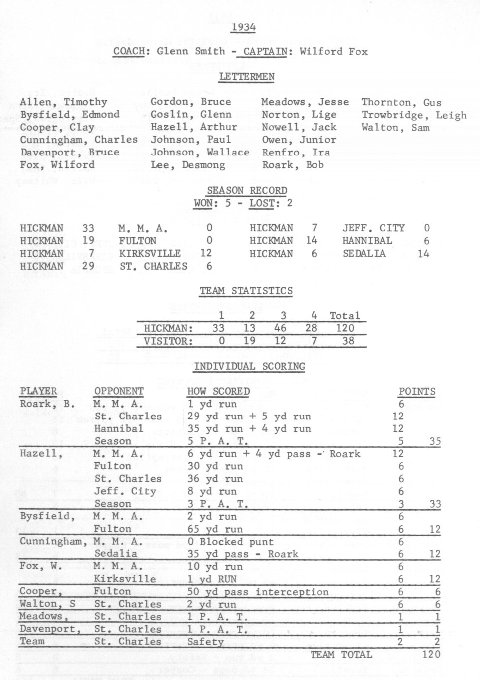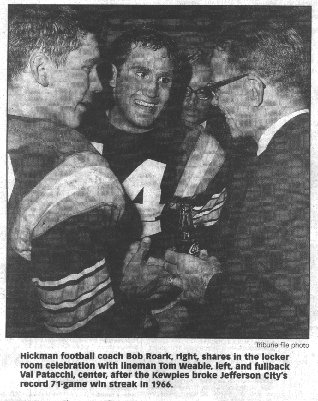|
His career consisted of 159 wins, 55 losses and 11 ties for a winning percentage of 74.2 %. He was the head coach longer than any other coach in the history of Hickman High School. As a player, Bob played his senior year of the '34 football season with the juniors that became the "Undefeated Team of 1935." See
Bob's team stats of 1934 below.
COURTESY OF "THE COLUMBIA DAILY TRIBUNE" Back to "Kewpie of the Month"
page
Download: Hickman High School Kewpie Football by Bob Roark (1894 - 1973)
Too often, we don’t more fully acknowledge publicly, those superb teachers and coaches who have made such a positive difference in so many young lives. Coach Bob Roark gave most all of his professional life and career to Hickman High School. He was a remarkable coach molded more in the Tom Landry image – controlled intensity, neat, a real student of the game and at all times a gentleman. While oftentimes appearing serious, he had a great sense of humor and was a joy to be around. As a player and as a young coach, he taught me some vitally important lessons, which helped me as a player at M.U. and later as a head football coach in high school and at N.E. Missouri State. Aside from those daily lessons, we all learned from him during practice and at game time, my personally greatest lesson came about when I went to tell him after the football season, that I was offered a football scholarship to M.U. As I rushed to tell him my good news, I expected to then receive his accolades and plaudits for this accomplishment. Instead, he thoughtfully paused and said to me, “Well, there will be a certain number who will flunk out, some who will get hurt and some more who will give up and quit.” He then said, “You might make it.” I left somewhat deflated with his realistic assessment of my chances. My freshman year at M.U., there were 17 ends out for practice on the first day in 1956. As the next four years unfolded, everything he told me would likely happen, did happen. Some flunked out, some got hurt, and some quit, to the point that four years later, I was the only Class of ’56 end left on our ’59 Orange Bowl team. I share this story because this was his analytical mind at work. He could have inflated my ego with praise and adulation, but instead he kept me grounded with the reality of what I would be facing and what I should expect. As an assistant to him in 1961 when I launched my own years as a football coach, he was the best sideline analyst of the game I was ever around. He could see things from the sideline that usually only coaches up in the press box could see. While he had a tremendous inner pride and was highly competitive, he was consistently humble and also made sure his players kept their hat sizes from getting too big. The highlight of my playing career for Coach Roark was our away game with Springfield Central, which at the time was the state’s largest high school. They led us 14-0 at halftime, and were going though us like a hot knife going through butter. After analyzing what we needed to do at halftime, he simply closed his halftime assessment with the words, “I think we can win.” He was right and win we did – 21-14. The influence of a great teacher and coach is truly immeasurable. Bob Roark’s best coaching advice to me as a young coach was, “Don’t tell a kid what to do. Show him!” I never forgot that advice and how often it proved to be correct. Admittedly, with Coach Roark’s passing, a little bit of my own self died. For almost 50 years, he has been a part of my life as a player, assistant coach, fan, and friend. Both on and off the field, he exemplified class. Bob Roark stood for everything the teaching and coaching profession should represent. I treasured my association with him and he will always remain as an integral part of my heart and soul. Athletics in general and football in particular, properly taught, is
one of the best teachers of the American way of life. Bob Roark was
not a rah-rah type coach. He was a fundamental teacher of the game,
a fair disciplinarian and he was intensely competitive, but always a gentleman.
Columbia, Hickman High School, and all of us as players and fans were fortunate
to have had him.
Russ Sloan
Back to "Kewpie of the Month"
page
--------------------------------------------------------------------------------
Roark’s quiet confidence, style left their mark By RUS BAER
Walking the Hickman sidelines on Friday nights with his finely pressed sport coat and tie, former Kewpies football coach Bob Roark had the look of former Dallas Cowboys coach Tom Landry. "That description would suit him to a T," said Jerry Whitesides, who played for and coached with the Hickman legend for nearly 30 years. "Tom Landry reminds me of him a lot." "He even had a hat like Landry," said John Moseley, another former player who went on to star at Missouri in the early 1970s. Of course, Roark sported the "Landry-look" long before Landry became the Cowboys’ first coach in 1960. Roark was the head football coach at Hickman from 1947-1971, leading the Kewpies to a 155-55-11 mark during those 25 years. Roark died on Saturday at the age of 82. He was buried at Memorial Park Cemetery yesterday. Using words such as professional, disciplined and quiet, several of his former players remembered their long-time coach. "He wasn’t as much the fire-and-brimstone-type guy, but you always knew who was in charge," Moseley said. "There was never a doubt who was in charge." Despite his quiet demeanor, Roark’s sharp appearance and knowledge of the game impressed his players. "You could tell he knew what he was doing," said Hickman baseball coach Kent Fewell, who played for Roark from 1965-67. "He was more of a discipline figure. He always wore a coat and tie and was very proper. People looked up to him. He had some outstanding teams and was very well-respected." It didn’t take Roark long to earn respect, despite opening his head coaching career with two losing seasons and a 3-13 record. Three years later the Kewpies were 9-0 in 1951. Hickman suffered only two more losing seasons under Roark. And then there was the contest at Jefferson City on Oct. 7, 1966. The Jays entered the fifth game of the season with a then-national record 71-game winning streak. In the week leading up to the annual rivalry, Roark displayed a confidence that quickly rubbed off on his players. "The Saturday before we played them he told us we were a great team and we could play with Jeff City," Fewell said. "From that Saturday on, we thought we were going to beat them." After using an unbalanced line to the wide side of the field in their four previous games, Roark switched up on the Jays and ran the unbalanced line to the short side of the field. Hickman rolled up 315 yards of total offense — all on the ground — to snap the Jays’ streak with a 27-6 upset. After the game, Roark called the victory the biggest thrill in his 20 years of coaching. "This is an evening I’ve got to look back on for a long time to come," Roark said at the time. The victory helped Roark win state high school coach of the year honors in 1966. Five years later, Roark led Hickman to its first MSHSAA playoff appearance in 1971. Major surgery in January of 1972 was a contributing factor to Roark’s surprise announcement on March 25 that he was stepping down as Hickman’s football coach. He remained with the school as athletic director and golf coach and eventually retired in 1976, ending a lengthy stay at Hickman as a student, coach and teacher that spanned five decades. "He had a big impact on a lot of players," said former MU kicker Greg Hill, a local insurance agent who played for Hickman in 1967-68. "He wasn’t one of those dynamic-type personalities like" Jeff City coach "Pete Adkins. He was just a good, solid coach." Which is all Roark was really worried about. "He was a teacher; that’s what it came down to," Fewell said. "And you could tell what he was teaching you was the right thing to do." "He’s somebody I really admired," said Whitesides, who regularly played golf with Roark up until this spring. "He’s somebody we’re going to miss." Roark is survived by his wife Margaret. In his honor, memorials can be made to the Outstanding
Football Player Scholarship, in care of Hickman athletic director Doug
Mirts, 1104 N. Providence Road, Columbia, Mo., 65203.
Back to "Kewpie of the Month"
page
|

 Hickman
football coach 1947-71
Hickman
football coach 1947-71